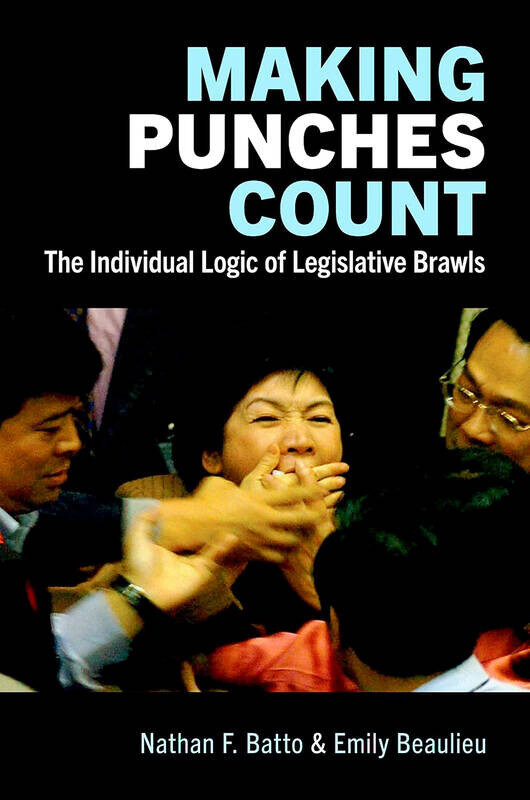
Bucheon-si, Gyeonggi-do, South Korea - The parallels drawn between Taiwan and Ukraine, two vibrant democracies shadowed by authoritarian neighbors and targets of hybrid warfare, have largely focused on their geopolitical vulnerabilities and societal resilience. However, a new perspective emerges from the book "Making the Punches Count" by Nathan F. Batto and Emily Beaulieu: the striking, yet often overlooked, similarity in the propensity for parliamentary brawls within their respective legislative bodies, the Legislative Yuan in Taiwan and the Verkhovna Rada in Ukraine.
While Ukraine's parliamentary pugilism has notably subsided since Russia's full-scale invasion in February 2023, a period marked by national unity and the suspension of pro-Russian parties, the historical prevalence of such incidents in both nations begs the question: why have these seemingly chaotic melees found such fertile ground?
Batto, a keen observer of Taiwanese electoral politics through his "Frozen Garlic" blog and a research fellow at Academia Sinica, and Beaulieu, a political scientist from the University of Kentucky specializing in contentious politics, challenge simplistic explanations rooted in "cultural norms" or inherent "predilections for violence." They firmly reject the notion of brawls as mere "passionate outbursts" by "hot-headed fighters."
Instead, the authors posit a compelling argument grounded in strategic signaling theory. They contend that legislators who engage in brawling are typically calculating individuals who have carefully weighed the potential benefits against the drawbacks of their actions. While their cost-benefit analyses may not always be accurate, their political acumen allows them to adeptly gauge how their target audiences and the broader public will perceive a brawl and to adjust their behavior accordingly.
The book underscores the seemingly paradoxical reality that while the general electorate in Taiwan tends to view legislative brawling as unseemly and detrimental to the nation's democratic image, specific demographics may be swayed by such displays, contingent on the prevailing political landscape, particularly the robustness of the party system and the institutional framework.
Drawing on signaling theory, which elucidates behaviors in the absence of robust institutional oversight, Batto and Beaulieu delve into identifying the intended recipients of these legislative brawls. In a strong party system like Taiwan's, the target audience is generally partisan, specifically those influential figures who significantly impact a legislator's career trajectory, such as party leaders, rank-and-file members, or loyal party supporters within the electorate.
The electoral system, the authors argue, plays a pivotal role in determining which segment is targeted. For instance, under Taiwan's former single nontransferable vote (SNTV) system, where multiple seats were contested within a district and voters could choose among several candidates from the same party, brawling served as a tool for candidates to distinguish themselves as "loyal party soldiers" and cultivate a personal voter base. This system, in place until 2008, contrasts with the current mixed system of parallel voting, which combines single-member plurality (SMP) districts with closed-list proportional representation (CLPR). In the SMP system, where nominations are often decentralized and influenced by telephone surveys, the target audience shifts towards loyal party supporters. Conversely, under the CLPR system, where party committees often controlled by the party chair determine nominees, the incentive for brawling to gain personal votes diminishes.
The authors' analysis of data from Taiwan initially appears to contradict their expectations, with SNTV lawmakers exhibiting the lowest "brawling intensity index." However, after accounting for the lower overall incidence of brawling during the SNTV era, this cohort emerges as the most prone to such behavior, followed by SMP lawmakers, with CLPR legislators displaying the lowest rates.
Challenging the notion that brawling is more prevalent among legislators from smaller, more extremist parties, Batto and Beaulieu argue that representatives from larger opposition parties are more likely to engage in physical altercations. In Taiwan's context, this was historically evident in the early days of democratization, with lawmakers from the then-fledgling Democratic Progressive Party (DPP) using disruptive tactics, including brawling, to signal their opposition to the ruling Chinese Nationalist Party (KMT). The late Ju Gau-jeng, nicknamed "Rambo," epitomized this combative style, viewing legislative disruption as a necessary tool against an unjust system.
While the political landscape in Ukraine, characterized by numerous smaller parties and greater fluidity in party affiliation, differs significantly from Taiwan's, the book reveals that brawling in the Verkhovna Rada was also a strategic maneuver. Factors such as linguistic divisions and the influence of Russia through oligarchs and trade in occupied territories often fueled these parliamentary clashes.
Backed by robust data, Batto and Beaulieu present a compelling case for understanding legislative brawling as a calculated political strategy. While acknowledging that psychological, cultural, and anthropological factors might play a role, the book persuasively argues that these incidents are far from random outbursts. Even so-called "honor brawlers" are analyzed as conveying specific messages, often related to accusations of corruption. A physical response to a perceived slur can underscore a legislator's integrity, while violent retaliation against those with known criminal ties can preempt perceptions of weakness.
Interestingly, the authors note the absence of belligerence among former professional fighters who transitioned into politics. Figures like former heavyweight boxing champion Vitali Klitschko, who served as a Ukrainian MP and is now the Mayor of Kyiv, and Huang Chih-hsiung, a Taiwanese Olympic taekwondo medalist and former legislator, never engaged in parliamentary brawls. While the connection between combat sports and aggression is complex and contested by recent studies, the juxtaposition of these athletes with "gangsters" who have a "penchant for violence" feels somewhat incongruous.
Ultimately, Batto and Beaulieu conclude that curbing legislative brawling requires political elites to actively disincentivize such behavior, given its perceived utility as a rational, albeit risky, political tactic. In deeply polarized societies where social cleavages and identity politics are potent forces, the path to achieving this remains a significant challenge.
[Copyright (c) Global Economic Times. All Rights Reserved.]




























